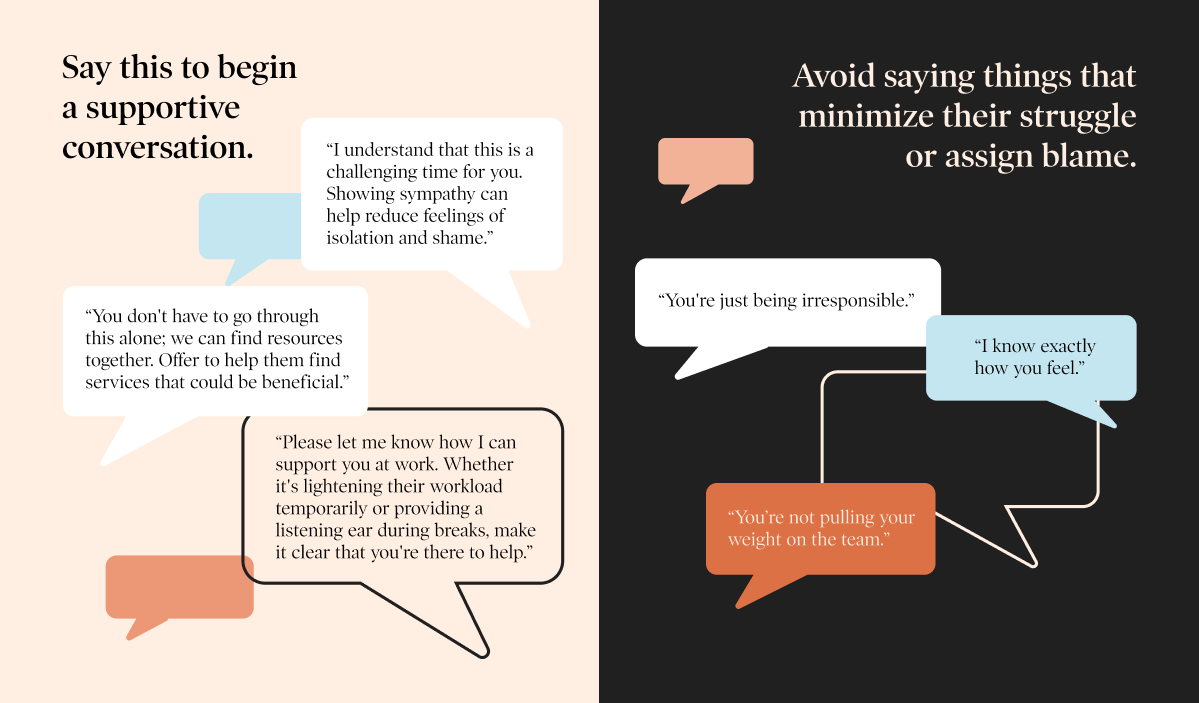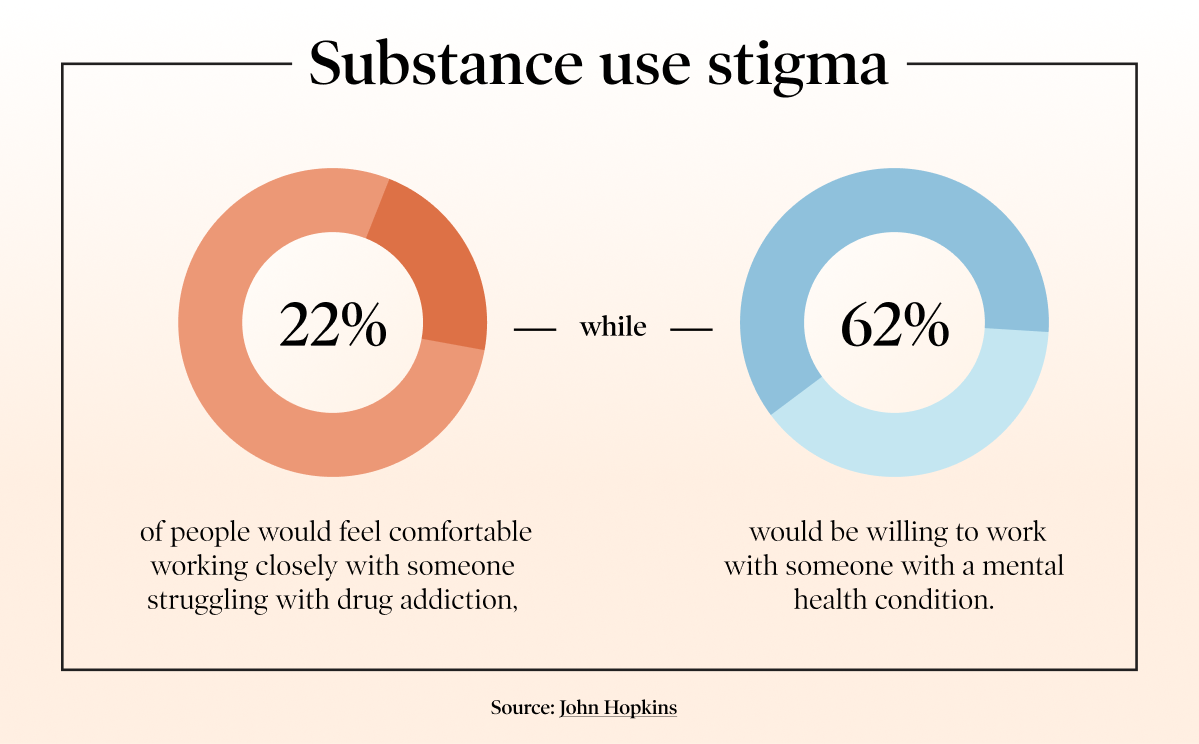$22.4 billion. That’s how much employers pay in lost productivity due to workforce substance use. The total cost to the Canadian economy is much higher, at $49.1 billion.
Substance use may seem like a personal problem, but it has serious repercussions on your workplace, affecting team morale, safety, and productivity levels. Yet, not all managers are skilled at spotting signs of substance use among their employees – or even know how to approach this sensitive subject.
So, as a manager or colleague, how do you recognize the warning signs early on? From changes in behaviour patterns to attendance rates and performance drops – there are key clues to watch out for when it comes to drug or alcohol addiction at work. And learn a few simple ways to provide support.
What you need to know about substance use
Substance use is a complex issue
It stems from various factors and impacts individuals differently. People may turn to substances as a means of coping with stress, pressure, or personal challenges, seeking temporary relief or an escape from their daily demands. But what might begin as occasional or seemingly harmless use can quickly escalate into a more serious problem if not managed appropriately.
Substance use exists on a spectrum
At one end, there's controlled and occasional use that doesn't affect overall well-being. Further down the spectrum, some use substances to cope with stress, but maintain functionality. As reliance increases, individuals might find themselves at a critical juncture where substance use begins to jeopardize job performance, relationships, and mental and physical health. At the far end, full-blown substance use disorder emerges, severely impacting work and personal life. Understanding this progression helps workplaces intervene effectively and offer the right support to create a healthier environment for all.
Substance use is often rooted in trauma
People who face discrimination or are part of historically marginalized groups may encounter a range of traumatic experiences, from microaggressions to overt violence. Trauma also touches abuse survivors and those living with PTSD. In order to deal with the pain from these experiences, individuals may turn to substances as a way to cope by:
-
Masking feelings of inadequacy
-
Easing anxiety and hypervigilance
-
Providing a temporary escape.
Over time, this coping strategy can evolve into an unmanageable dependence, affecting not only the individual's personal life, but also their professional performance and interactions in the workplace.
Recognize the signs of substance use disorder
Change in behaviour or personality
It’s not uncommon for colleagues to isolate themselves as they become overwhelmed by their addiction. They may also exhibit feelings of sadness, anger, or anxiety when not under the influence. If experiencing withdrawal, they may experience a host of cognitive deficits, like poor working memory, lack of alertness, trouble concentrating, and impaired decision-making abilities.
All of these changes can impact their performance at work and their relationship with team members. To sustain their addiction, they might take risks to obtain and consume drugs or alcohol, while losing interest in activities they once enjoyed.
Increased absenteeism
Employees with substance use disorders experience significantly higher rates of absenteeism:
-
7 extra days for marijuana use
-
15 days for opioid use
-
23 days for the use of more than one drug
Under the influence or recovering from the after-effects (like hangovers or withdrawal), they may struggle to maintain a consistent schedule, arriving late or leaving early. Often, this is accompanied by vague excuses related to personal illness or family troubles.
Decline in physical health and appearance
Is your team member displaying any of the following signs?
-
Bloodshot eyes
-
Poor skin tone
-
Chronic headaches
-
Persistent flu-like symptoms
Substance use can take a noticeable toll on the body, and it may be further exacerbated by changes in appetite, often leading to weight loss. As a result, low energy during daily activities can significantly impact work performance and overall productivity.
A lack of concern for personal appearance and hygiene is another indicator, which becomes particularly apparent in more formal workplaces.
Show compassion and empathy
Substance use issues are typically accompanied by emotional struggles. So, listen actively and without judgment if a colleague decides to share their experiences or feelings. Let them know that you care about their well-being and that they can talk to you openly without fear of being criticized.
Your colleague's productivity and performance might take a hit, so offer to help with work tasks or responsibilities. But also encourage them to take ownership of their work and seek help from a manager or human resources if needed.
Encourage professional help
While your intentions may be good, remember that you’re not a professional. Encouraging them to seek clinical care is essential for their well-being, and can potentially prevent the issue from escalating.
If your colleague is open to seeking support, offer to help find suitable treatment options and support groups in your area. Your organization is a good place to start. Find out if you have access to an employee assistance program that can connect your team member to a therapist, counsellor, or substance use specialist.
Keep in mind that your colleague might not be ready to accept help immediately. They may need time to process the conversation and come to terms with their situation. Respect their decision, but let them know that you'll be there to support them whenever they’re ready.

Respect their boundaries
When you respect someone's boundaries, they’re more likely to trust you. Trust is essential when dealing with sensitive issues like substance use, as it can make your colleague feel safer and more open to seeking help. Don't pressure them into disclosing personal details or getting help if they’re not ready. And don't share their situation with others unless they explicitly give you permission to do so.
Respecting boundaries allows your colleague to maintain their autonomy and make their own decisions about seeking help. Pushing someone beyond their comfort zone can be counterproductive and make them feel disempowered. And if you overstep your colleague's boundaries, it could lead to unintended harm. They may withdraw further, feel attacked, or become defensive, hindering any potential progress.
What about your own boundaries?
Trying to help someone with substance use issues can be emotionally taxing. Respecting boundaries allows you to maintain your own well-being and set boundaries for yourself as well. Remember that your colleague's substance use issues are not your fault or responsibility to fix. You can offer support and assistance, but the ultimate responsibility for their well-being lies with them.
Learn to overcome stigma
Employees struggling with substance use issues may be hesitant to seek help or support due to fear of judgment, discrimination, or potential repercussions at work. This can lead to their condition worsening over time and may negatively impact their emotional well-being.
By educating yourself about addiction, you can gain a deeper understanding of its complexities. This knowledge will help you recognize that addiction is a chronic medical condition, not a moral failing. Substance use disorders are often linked to deeper emotional and psychological issues, and having this awareness can prevent you from being judgmental or dismissive.
Prioritizing prevention and support
Substance use frequently points to underlying mental or physical health issues. Recognizing this early on allows us to address these concerns proactively before they become too hard to manage.
Programs like Dialogue Mental Health+ helps you and your team members consult with a therapist when needed. This can equip you with the necessary skills to reduce stress, anxiety, and negative emotions, which may otherwise become overwhelming and lead to substance use as a coping mechanism.
Focusing on physical well-being and mindfulness are also effective ways to cope. Dialogue's Wellness program empowers employees to cultivate better habits, providing personalized content tailored to their needs. Consequently, you and your team members gain convenient access to alternative coping methods, beyond relying on substance use.




 Canada (EN)
Canada (EN)
 Global (EN)
Global (EN)
.jpg?width=564&height=317&name=Blog-header_TEMPLATE%20(2).jpg)









